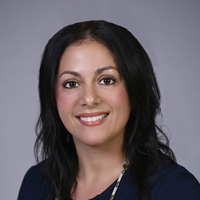How Women Can Achieve Financial Empowerment – and a Better Retirement
If you're a married woman, chances are that one day you will be a widow. Will you be ready to handle finances on your own? Here's how to get started now to help put yourself in a better position to do that.


Profit and prosper with the best of Kiplinger's advice on investing, taxes, retirement, personal finance and much more. Delivered daily. Enter your email in the box and click Sign Me Up.
You are now subscribed
Your newsletter sign-up was successful
Want to add more newsletters?

Delivered daily
Kiplinger Today
Profit and prosper with the best of Kiplinger's advice on investing, taxes, retirement, personal finance and much more delivered daily. Smart money moves start here.

Sent five days a week
Kiplinger A Step Ahead
Get practical help to make better financial decisions in your everyday life, from spending to savings on top deals.

Delivered daily
Kiplinger Closing Bell
Get today's biggest financial and investing headlines delivered to your inbox every day the U.S. stock market is open.

Sent twice a week
Kiplinger Adviser Intel
Financial pros across the country share best practices and fresh tactics to preserve and grow your wealth.

Delivered weekly
Kiplinger Tax Tips
Trim your federal and state tax bills with practical tax-planning and tax-cutting strategies.

Sent twice a week
Kiplinger Retirement Tips
Your twice-a-week guide to planning and enjoying a financially secure and richly rewarding retirement

Sent bimonthly.
Kiplinger Adviser Angle
Insights for advisers, wealth managers and other financial professionals.

Sent twice a week
Kiplinger Investing Weekly
Your twice-a-week roundup of promising stocks, funds, companies and industries you should consider, ones you should avoid, and why.

Sent weekly for six weeks
Kiplinger Invest for Retirement
Your step-by-step six-part series on how to invest for retirement, from devising a successful strategy to exactly which investments to choose.
The retirement years can be — ideally — among the happiest years of a married couple’s lives.
The sad reality, of course, is that ultimately one will be living without the other. Most often, it’s the women who end up alone. Women generally outlive men and are more than three times as likely as men to lose their spouse. One report showed just how dramatic this is. About 75% of men ages 65 to 74 are married, compared with 58% of women in that age span. When they reach ages 75 to 84, that percentage for men remains the same, but it drops to 42% for women. And almost 60% of men over 85 are still married, but just 17% of women are.
Then there’s this sobering reality: Most widows feel unprepared to make key financial decisions in their live-alone years. A Merrill Lynch/Age Wave survey of over 3,000 respondents found that just 14% of widows were making financial decisions on their own before their husbands died.
From just $107.88 $24.99 for Kiplinger Personal Finance
Become a smarter, better informed investor. Subscribe from just $107.88 $24.99, plus get up to 4 Special Issues

Sign up for Kiplinger’s Free Newsletters
Profit and prosper with the best of expert advice on investing, taxes, retirement, personal finance and more - straight to your e-mail.
Profit and prosper with the best of expert advice - straight to your e-mail.
Thus, it’s extremely important for women to empower themselves with the tools they’ll need to take ownership of their financial future. These are some key points to consider when planning for life without your spouse:
Know where everything is located.
Most men control the family finances, so a common hurdle for many widows is not knowing the locations of all the accounts and important financial documents. This could be an extensive list: brokerage statements, savings accounts, life insurance policies, a will, tax returns of the previous seven years, all the passwords, etc.
It’s critical for a surviving spouse to know what they have to work with financially and how to transition those important pieces.
Get financially organized in a binder.
You feel financially empowered if you have everything organized in one place. All of your financial information can go here, and you can organize the binder into the following sections, divided by tabs:
- Goals. Write your financial goals in this section; they’re more likely to become reality when they are written down and you visualize them.
- Budget. This includes all of your monthly expenses, written in detail. Make sure your bills are paid in a timely fashion and file for any death benefits from life insurance policies. You’ll also want to review your immediate insurance needs and health coverage. It’s extremely important you get a handle on your spending. People wrongly assume that financial independence is due to how much money you make, when in fact most pitfalls are caused by overspending and not adhering to a monthly budget that makes sense. Freddie Mac has a free budget worksheet you can download.
- Investments. Divide this tab into two sections — one for retirement assets (401(k), 403(b), 457, etc.) and one for non-retirement assets (bank statements, individual brokerage accounts, etc.).
- Social Security. Compile the information for this tab by going online to ssa.gov, creating a login, verifying your earned income history and listing your estimated benefits.
- Taxes. The last five years of tax returns and any tax plan strategy goes in this tab.
- Estate planning. A living will or trust goes here.
- College planning. Roths, 529s and any college-related funding.
- Debt. Make sure this tab is in red, so it gets your attention and adds urgency to get rid of it. This section should include credit card statements and loans, mortgages, etc.
Have a plan, for both income and taxes.
The primary concern in retirement is income, and if you don’t have a plan, you won’t know what your actual potential is in terms of a retirement lifestyle. And don’t just focus on annual total amounts, but also develop a schedule of allotments — the increments you plan to take out from different sources, such as a non-qualified plan or tax-deferred plans. (For more, see 3 Key Goals for Building a Retirement Income Plan.)
Know the fundamentals of Social Security.
As most companies have done away with pensions, retirement income planning is much different today, so a widow is usually left with Social Security and personal savings. It’s imperative that the couple plan ahead and make sure they know how to maximize Social Security benefits for the survivor. (For more, see Social Security Survivors Benefit: Plan for Loss of a Spouse.)
Max your tax-deferred and tax-free vehicles.
These come by such avenues as your employer-sponsored plan, taking it up to the company match; your Roth IRA (no required minimum distributions and withdrawals are tax-free as long as you are 59½ or older and have had a Roth for five years or longer); and your savings account. Again comes the myth that being financially independent depends on the dollars you make; to the contrary, it’s about diligently saving every month and letting that compound interest build. You need savings discipline.
Take advantage of tax strategies.
Consider working with a tax adviser to take advantage of strategies that will protect more of your income, like the catch-up provision, for example. When you are 50 years old or older, the catch-up provision allows you to save more in your company’s 401(k) or 403(b) while lowering your tax base. In 2019, the maximum 401(k) contribution is $19,000, but if you’re 50 or older, the catch-up provision allows a contribution of $6,000 on top of that $19,000. There is also a $1,000 catch-up contribution available in IRAs for people 50 and older.
Plan your legacy.
Do you have an estate plan and a will? You want to make things as easy as possible for your heirs, so have specific plans in place for them. You don’t need to overcomplicate things. There isn’t a need for most people to get a fancy, expensive trust. For most Americans, if you have a relatively simple estate, you just need a simple will, and you can do that relatively easily through vehicles like LegalZoom.
Also, it’s important to have a power of attorney (For more, see Choose Agents for Power of Attorney, Health Care Proxy Carefully) and beneficiaries designated on all accounts.
Know your market risk tolerance level.
Are you taking undue risk in your investment portfolio? Are you being heard by your financial adviser? With balanced asset allocation, you have a blend of stocks, bonds and cash that aligns with your risk tolerance level and your timeline. If you have a certain retirement lifestyle, and you have enough assets where you don’t have to take undue risks, you should make sure your portfolio isn’t being exposed unnecessarily.
To see if you’re on target with the amount of risk you’re taking, fill out a questionnaire from a financial adviser. A detailed list of questions about your financial status, investments and goals can give you a good read on your risk tolerance and help build a balanced portfolio.
There’s a frequent misconception that the biggest factor to determine long-term financial success is market timing. Rather, it’s time in the market, and proper asset allocation and diversification.
Final thoughts.
Good financial preparation certainly impacts the enjoyment level of the golden years. Having the financial house in order is even more important when a spouse passes. By gaining financial knowledge and confidence, women can build resilience and courage and feel empowered.
Dan Dunkin contributed to this article.
Profit and prosper with the best of Kiplinger's advice on investing, taxes, retirement, personal finance and much more. Delivered daily. Enter your email in the box and click Sign Me Up.

Dina Siracusa is an investment adviser representative and is vice president at Provident Wealth Advisors. She has more than 15 years of experience in personal finance and has an MBA in finance from Loyola University. She also holds a Certified Divorce Financial Analyst (CDFA®) designation. Dina is fluent in several languages and published an international cookbook that she wrote with her daughters.
-
 Nasdaq Leads a Rocky Risk-On Rally: Stock Market Today
Nasdaq Leads a Rocky Risk-On Rally: Stock Market TodayAnother worrying bout of late-session weakness couldn't take down the main equity indexes on Wednesday.
-
 Quiz: Do You Know How to Avoid the "Medigap Trap?"
Quiz: Do You Know How to Avoid the "Medigap Trap?"Quiz Test your basic knowledge of the "Medigap Trap" in our quick quiz.
-
 5 Top Tax-Efficient Mutual Funds for Smarter Investing
5 Top Tax-Efficient Mutual Funds for Smarter InvestingMutual funds are many things, but "tax-friendly" usually isn't one of them. These are the exceptions.
-
 Social Security Break-Even Math Is Helpful, But Don't Let It Dictate When You'll File
Social Security Break-Even Math Is Helpful, But Don't Let It Dictate When You'll FileYour Social Security break-even age tells you how long you'd need to live for delaying to pay off, but shouldn't be the sole basis for deciding when to claim.
-
 I'm an Opportunity Zone Pro: This Is How to Deliver Roth-Like Tax-Free Growth (Without Contribution Limits)
I'm an Opportunity Zone Pro: This Is How to Deliver Roth-Like Tax-Free Growth (Without Contribution Limits)Investors who combine Roth IRAs, the gold standard of tax-free savings, with qualified opportunity funds could enjoy decades of tax-free growth.
-
 One of the Most Powerful Wealth-Building Moves a Woman Can Make: A Midcareer Pivot
One of the Most Powerful Wealth-Building Moves a Woman Can Make: A Midcareer PivotIf it feels like you can't sustain what you're doing for the next 20 years, it's time for an honest look at what's draining you and what energizes you.
-
 I'm a Wealth Adviser Obsessed With Mahjong: Here Are 8 Ways It Can Teach Us How to Manage Our Money
I'm a Wealth Adviser Obsessed With Mahjong: Here Are 8 Ways It Can Teach Us How to Manage Our MoneyThis increasingly popular Chinese game can teach us not only how to help manage our money but also how important it is to connect with other people.
-
 Looking for a Financial Book That Won't Put Your Young Adult to Sleep? This One Makes 'Cents'
Looking for a Financial Book That Won't Put Your Young Adult to Sleep? This One Makes 'Cents'"Wealth Your Way" by Cosmo DeStefano offers a highly accessible guide for young adults and their parents on building wealth through simple, consistent habits.
-
 Global Uncertainty Has Investors Running Scared: This Is How Advisers Can Reassure Them
Global Uncertainty Has Investors Running Scared: This Is How Advisers Can Reassure ThemHow can advisers reassure clients nervous about their plans in an increasingly complex and rapidly changing world? This conversational framework provides the key.
-
 I'm a Real Estate Investing Pro: This Is How to Use 1031 Exchanges to Scale Up Your Real Estate Empire
I'm a Real Estate Investing Pro: This Is How to Use 1031 Exchanges to Scale Up Your Real Estate EmpireSmall rental properties can be excellent investments, but you can use 1031 exchanges to transition to commercial real estate for bigger wealth-building.
-
 Should You Jump on the Roth Conversion Bandwagon? A Financial Adviser Weighs In
Should You Jump on the Roth Conversion Bandwagon? A Financial Adviser Weighs InRoth conversions are all the rage, but what works well for one household can cause financial strain for another. This is what you should consider before moving ahead.